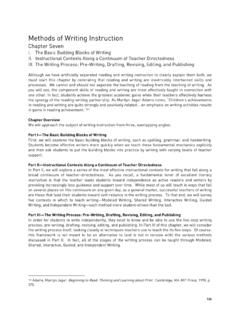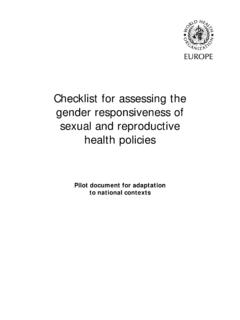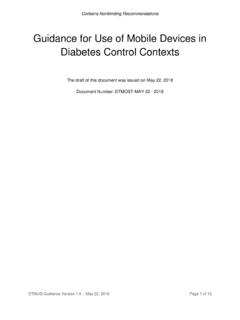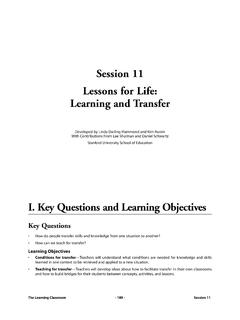Transcription of LEARNING VOCABULARY IN EFL CONTEXTS THROUGH …
1 Novitas-ROYAL, Vol.: 1(2), ISSN: 1307-4733 84 LEARNING VOCABULARY IN EFL CONTEXTS THROUGH VOCABULARY LEARNING STRATEGIES Lotfi Ghazal Abstract: VOCABULARY LEARNING is one of the major challenges foreign language learners face during the process of LEARNING a language. One way to alley the burden is to assist students in becoming independent learners during the process of L2 VOCABULARY LEARNING . This could be achieved THROUGH instructing learners to apply VOCABULARY LEARNING strategies as efficiently as possible. The main pursuit of the present article is to suggest a framework for training EFL learners in VOCABULARY LEARNING strategies.
2 In so doing, an account of different taxonomies of VOCABULARY LEARNING strategies and a rationale for strategy training are presented. Keywords: VOCABULARY , LEARNING , strategy, style, training, independent LEARNING zet: Yabanc dil renirken, rencilerin kar la t en b y k zorluklardan bir tanesi de kelime renmektir. Bu zorlu u a abilme y ntemlerinden biri, rencileri dil renme s recinde ba ms z k labilmektir. Bu da ancak rencilere kelime renme stratejilerini en etkin bi imde nas l kullanabileceklerini retme ile m mk nd r. Bu al man n amac , ngilizceyi yabanc dil olarak renen rencilere y nelik, kelime renme stratejileri e itiminin genel bir er evesini izmektir.
3 Ayr ca, kelime renme stratejilerine ait farkl s n fland rmalar ve strateji e itiminin gereklili ine dair sebepler sunulacakt r. Anahtar S zc kler: kelime, renme, strateji, stil, e itim, ba ms z renme 1. INTRODUCTION VOCABULARY is central to language and is of great significance to language learners. Words are the building blocks of a language since they label objects, actions, ideas without which people cannot convey the intended meaning. The prominent role of VOCABULARY knowledge in second or foreign language LEARNING has been recently recognized by theorists and researchers in the field.
4 Accordingly, numerous types of approaches, techniques, exercises and practice have been introduced into the field to teach VOCABULARY (Hatch & Brown, 1995). It has been suggested that teaching VOCABULARY should not only consist of teaching specific words but also aim at equipping learners with strategies necessary to expand their VOCABULARY knowledge (Hulstjin, 1993, cited in Morin & Goebel, 2001). VOCABULARY LEARNING strategies are one part of language LEARNING strategies which in turn are part of general LEARNING strategies (Nation, 2001).
5 Language LEARNING strategies encourage greater overall self-direction for learners. Self-directed learners are independent learners who are capable of assuming responsibility for their own LEARNING and gradually gaining confidence, involvement and proficiency (Oxford, 1990). So is the case with VOCABULARY LEARNING strategies. Thus, students need training in VOCABULARY LEARNING strategies they need most. Research has shown that many learners do use more strategies to learn VOCABULARY especially when compared to such integrated tasks such as listening and speaking.
6 But they are mostly inclined to use basic VOCABULARY LEARNING strategies (Schmitt, 1997). This in turn makes strategy instruction an essential part of any foreign or second language program. Islamic Azad University, Novitas-ROYAL, Vol.: 1(2), ISSN: 1307-4733 85 Hence, based on the significance attributed to VOCABULARY LEARNING strategies in the process of VOCABULARY LEARNING and enhancement, the present paper aims at proposing a framework for VOCABULARY strategy instruction in English as a foreign language!
7 EFL) CONTEXTS . To this end, a brief account of various taxonomies of VOCABULARY LEARNING strategies and a rationale for training students in VOCABULARY LEARNING strategies are initially presented. Then, some required considerations to be taken before initiating the strategy training as well as the techniques for training EFL students in VOCABULARY LEARNING strategies are presented. Finally, some pedagogical implications are proposed for EFL teachers. 2. TAXONOMIES OF VOCABULARY LEARNING STRATEGIES Word knowledge is an essential component of communicative competence (Seal, 1991), and it is important for both production and comprehension in a foreign language.
8 Knowing a word involves knowing: a great deal about its general frequency of use, syntactic and situational limitations on its use, its underlying form and the forms that can be derived from it, the network of its semantic features and, the various meanings associated with the item. (Richards, 1976) Knowing a word is also defined as knowing its spelling, pronunciation, collocations ( words it co-occurs with), and appropriateness (Nation, 1990). Therefore, lexical competence is far more than the ability to define a given number of words and covers a wide range of knowledge which in turn requires a variety of strategies to gain the knowledge.
9 Foreign language learners may then use various strategies to acquire the target language word knowledge. Taking this into consideration, second and foreign language researchers have made various attempts to classify VOCABULARY LEARNING strategies employed by foreign and second language learners (F&SLL). Instances of such classifications are the taxonomies proposed by Gu and Johnson (1996), Schmitt (1997) and Nation (2001) which are briefly discussed below. Gu and Johnson (1996) list second language (L2) VOCABULARY LEARNING strategies as metacognitive, cognitive, memory and activation strategies.
10 Metacognitive strategies consist of selective attention and self-initiation strategies. F&SLLs who employ selective attention strategies know which words are important for them to learn and are essential for adequate comprehension of a passage. Learners employing self-initiation strategies use a variety of means to make the meaning of VOCABULARY items clear. Cognitive strategies in Gu and Johnson s taxonomy entail guessing strategies, skillful use of dictionaries and note-taking strategies. Learners using guessing strategies draw upon their background knowledge and use linguistic clues like grammatical structures of a sentence to guess the meaning of a word.






